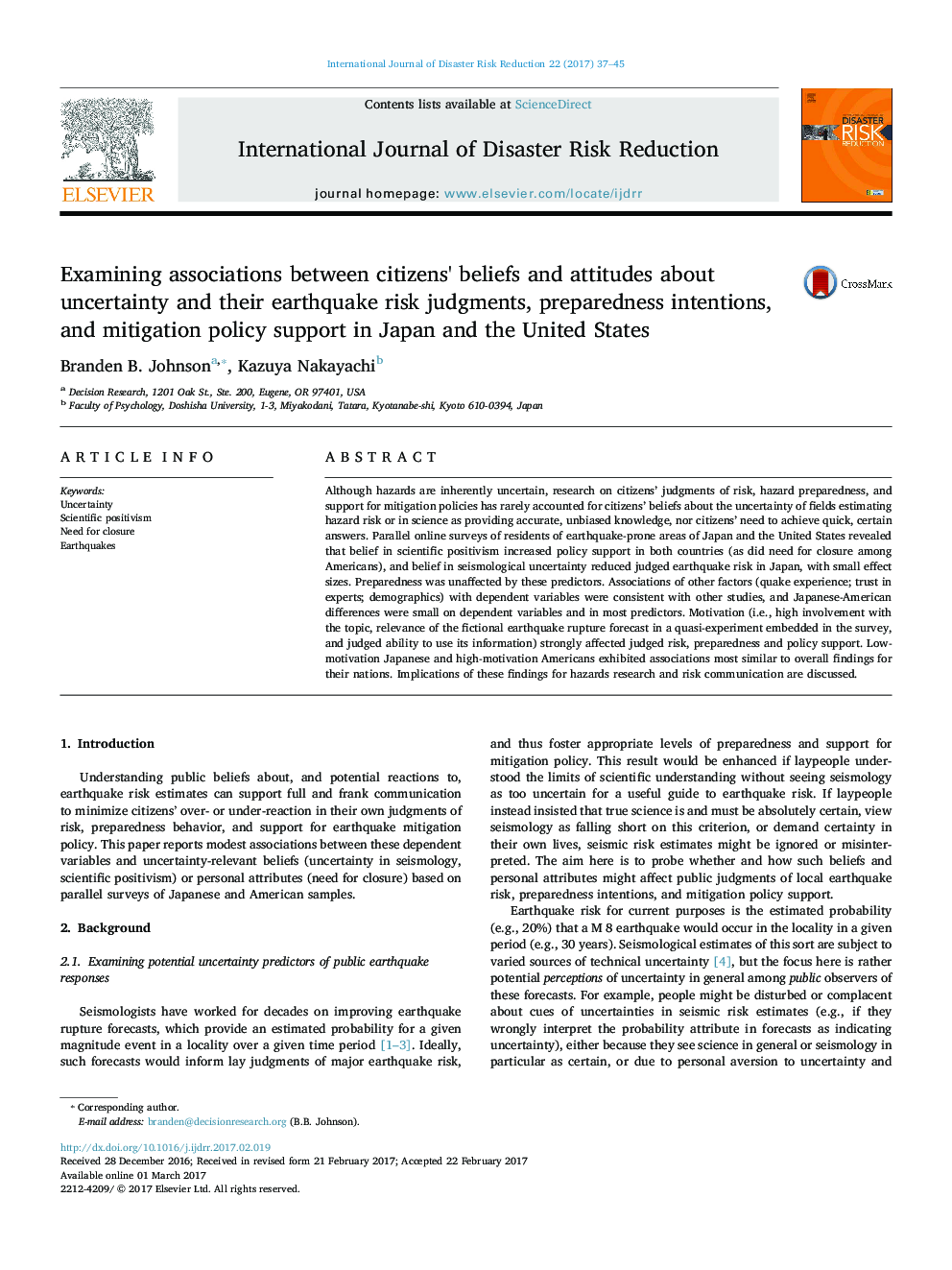| کد مقاله | کد نشریه | سال انتشار | مقاله انگلیسی | نسخه تمام متن |
|---|---|---|---|---|
| 5116076 | 1485148 | 2017 | 9 صفحه PDF | دانلود رایگان |
عنوان انگلیسی مقاله ISI
Examining associations between citizens' beliefs and attitudes about uncertainty and their earthquake risk judgments, preparedness intentions, and mitigation policy support in Japan and the United States
ترجمه فارسی عنوان
بررسی ارتباطات بین باورهای شهروندی و نگرش نسبت به عدم قطعیت و تصمیمات مربوط به خطر زلزله، قصد آمادگی و پشتیبانی سیاست های کاهش در ژاپن و ایالات متحده
دانلود مقاله + سفارش ترجمه
دانلود مقاله ISI انگلیسی
رایگان برای ایرانیان
کلمات کلیدی
عدم قطعیت، مثبت گرایی علمی، نیاز به بسته شدن زمین لرزه،
ترجمه چکیده
اگر چه خطرات به طور ذاتی غیرقابل اطمینان هستند، تحقیقات در مورد قضاوت شهروندان از خطر، آمادگی خطر و حمایت از سیاست های کاهش می یابد به ندرت به اعتقادات شهروندان در مورد عدم اطمینان از زمینه های برآورد خطر خطر یا در علم به عنوان ارائه دانش دقیق، بی طرفانه و نه شهروندان نیاز به پاسخ سریع و دقیق دارد. بررسی های موازی آنلاین ساکنان ناحیه زلزله ژاپن و ایالات متحده نشان داد که اعتقاد به پوزیتیویسم علمی، حمایت سیاسی در هر دو کشور را افزایش داده است (همانطور که نیاز به بستن در میان آمریکایی ها بود)، و اعتقاد به عدم اطمینان زلزله، خطر زلزله محکوم شده در ژاپن را کاهش داد، با اندازه اثر کوچک. آمادگی این پیش بینی ها تحت تأثیر قرار نگرفت. انجمن های دیگر عوامل (تجربه زلزله، اعتماد به متخصصان، جمعیت شناسی) با متغیرهای وابسته با سایر مطالعات همخوانی داشت، و اختلاف بین ژاپن و آمریکا بر متغیرهای وابسته و اغلب پیش بینی کننده ها کوچک بود. انگیزه (به عنوان مثال، مشارکت زیاد در موضوع، ارتباط پیش بینی پارگی زلزله داستانی در یک شبه آزمایشی که در این بررسی قرار گرفته است و توانایی استفاده از اطلاعات آن را مورد قضاوت قرار داد، شدیدا تحت تأثیر ریسک، آمادگی و حمایت سیاسی قرار گرفت. انگیزه کم انگیزه ژاپنی و انگیزه بالا آمریکایی ها انجمن هایی را نشان می دهند که بیشتر شبیه به یافته های کلی کشورشان است. نتایج این یافته ها برای تحقیقات خطرات و ارتباطات ریسک مورد بحث قرار گرفته است.
موضوعات مرتبط
مهندسی و علوم پایه
علوم زمین و سیارات
فیزیک زمین (ژئو فیزیک)
چکیده انگلیسی
Although hazards are inherently uncertain, research on citizens' judgments of risk, hazard preparedness, and support for mitigation policies has rarely accounted for citizens' beliefs about the uncertainty of fields estimating hazard risk or in science as providing accurate, unbiased knowledge, nor citizens' need to achieve quick, certain answers. Parallel online surveys of residents of earthquake-prone areas of Japan and the United States revealed that belief in scientific positivism increased policy support in both countries (as did need for closure among Americans), and belief in seismological uncertainty reduced judged earthquake risk in Japan, with small effect sizes. Preparedness was unaffected by these predictors. Associations of other factors (quake experience; trust in experts; demographics) with dependent variables were consistent with other studies, and Japanese-American differences were small on dependent variables and in most predictors. Motivation (i.e., high involvement with the topic, relevance of the fictional earthquake rupture forecast in a quasi-experiment embedded in the survey, and judged ability to use its information) strongly affected judged risk, preparedness and policy support. Low-motivation Japanese and high-motivation Americans exhibited associations most similar to overall findings for their nations. Implications of these findings for hazards research and risk communication are discussed.
ناشر
Database: Elsevier - ScienceDirect (ساینس دایرکت)
Journal: International Journal of Disaster Risk Reduction - Volume 22, June 2017, Pages 37-45
Journal: International Journal of Disaster Risk Reduction - Volume 22, June 2017, Pages 37-45
نویسندگان
Branden B. Johnson, Kazuya Nakayachi,
